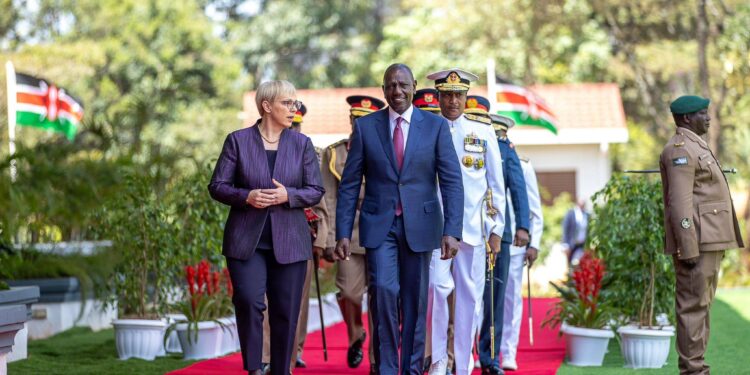Slovenian President Nataša Pirc Musar concluded her three-day State Visit to Kenya on June 3, marking a historic first by a Slovenian Head of State to the continent. The visit, which coincided with Kenya’s 62nd Madaraka Day celebrations in Homa Bay County, laid the foundation for an expansive new chapter in diplomatic, economic and technological cooperation between the two countries.
President Musar’s visit was not symbolic alone. It was marked by a series of high-level engagements with President William Ruto and senior government officials that reaffirmed shared values, set actionable bilateral goals and reinforced Kenya’s growing importance as a strategic partner to the European Union and Central Europe. At the core of the visit was a mutual commitment to multilateralism, sustainable development, and innovation.
Addressing the media at State House, Nairobi, President Musar emphasized that both Kenya and Slovenia believe strongly in the United Nations, international law and inclusive dialogue as the means to address global challenges. The two countries agreed to deepen engagement at the United Nations General Assembly, support inclusive reforms at the Security Council, and collaborate at COP30 in Brazil where climate resilience will be a key focus. Slovenia’s current tenure as a non-permanent member of the UN Security Council adds critical weight to these shared aspirations.
President Ruto lauded Slovenia’s growing diplomatic leadership and welcomed Musar’s support for Africa’s permanent representation at the Security Council. He reaffirmed Kenya’s call for an inclusive international financial system and hailed Slovenia’s endorsement of the upcoming International Conference on Financing for Development set to take place in Nairobi next year.
Environmental and climate cooperation emerged as a flagship outcome of the visit. President Musar commended Kenya’s ambitious reforestation programme to plant 15 billion trees by 2032, describing it as a gift not only to Kenya but to the entire planet. She visited the Wire Forest Station in Homa Bay where she interacted with the Wire Forest Management Association, a community group engaging in climate-smart apiculture. Musar praised their model for empowering women and protecting biodiversity, and highlighted similar Slovenian grassroots models that advance rural livelihoods.
Kenya and Slovenia also strengthened their collaboration in space science and environmental monitoring. The newly inaugurated Climate Hub at Jomo Kenyatta University of Agriculture and Technology, developed in partnership with Slovenia’s SPACE-SI, stands as a tangible product of this partnership. The Hub integrates satellite data with community innovation, enabling flood forecasting and smart climate responses across sectors. President Musar’s presence at the Climate Resilience Forum at JKUAT further demonstrated the two countries’ shared vision for science-based development.
Economic cooperation was a second pillar of the visit. President Ruto announced the launch of the Kenya–Slovenia Business Forum, designed to unlock investment in clean energy, digital services, agro-processing, pharmaceuticals and ICT. The two leaders emphasized the potential of the Kenya–EU Economic Partnership Agreement and Slovenia’s role in creating awareness among European businesses.
President Musar also toured Kewat Industries Ltd in Nairobi, a joint venture between Slovenian, Kenyan and German investors. The company’s production of polyethylene boats for Lake Victoria and plans for water treatment solutions align with Kenya’s blue economy priorities and Slovenia’s expertise in circular manufacturing.
The digital agenda featured prominently. Slovenia’s experience in e-government, cybersecurity, artificial intelligence and digital identity systems offers Kenya actionable models as it works to become Africa’s digital hub. Both countries agreed to explore smart farming, data protection and digital inclusion, particularly with a focus on gender equality. President Ruto highlighted the importance of Slovenia’s high female representation in leadership and welcomed cooperation in leadership training for women and girls in the tech space.
The education and youth development sectors were also brought to the fore. Kenya expressed strong interest in adapting Slovenia’s dual vocational training system to equip its youth with employable skills. The two countries agreed to strengthen cooperation in science and vocational education through institutional exchanges.
The visit concluded with the signing of a memorandum of understanding to institutionalize regular political consultations. This will create a structured framework for monitoring bilateral progress, expanding cooperation and resolving emerging challenges.
President Musar’s participation in the Madaraka Day celebrations in Homa Bay and her interactions with local communities, students, entrepreneurs and innovators reflected the depth and sincerity of Slovenia’s commitment to a people-centered diplomacy. Her engagements in Nairobi and across multiple counties underscored the growing geopolitical and economic relevance of Kenya to European partners seeking constructive engagement in Africa.
President Ruto described the visit as a turning point in Kenya–Slovenia relations. He welcomed the new momentum and reiterated Kenya’s readiness to scale this partnership across green energy, environmental protection, innovation and regional peace.
The State Visit affirmed Slovenia as a valuable and forward-looking partner to Kenya. It demonstrated how small but capable European nations can form meaningful alliances with African countries that share a vision for equity, sustainability and global cooperation.
Kenya’s foreign exchange reserves have climbed to a historic high of nearly $10.59 billion, according to the latest financial markets bulletin released by the Central Bank of Kenya...
Read moreDetails









